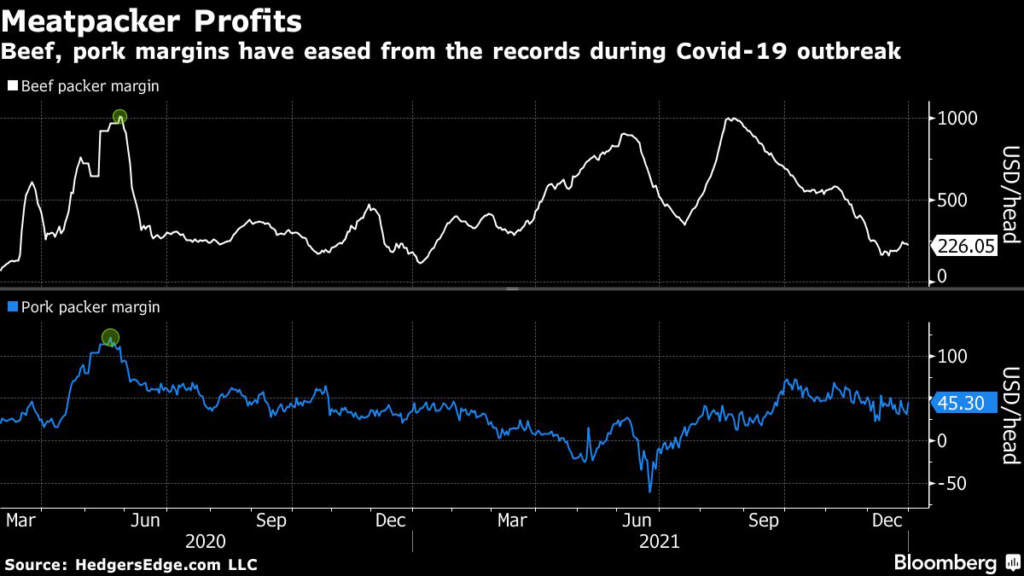(Bloomberg) — President Joe Biden will announce plans Monday to combat the market power of the giant conglomerates that dominate meat and poultry processing, ratcheting up a months-long campaign that has blamed anti-competitive practices in the industry for contributing to surging food inflation.
Biden will join Agriculture Secretary Tom Vilsack and Attorney General Merrick Garland to meet virtually with ranchers and farmers to hear complaints about consolidation in the industry, while a newly launched portal will allow them to report unfair trade practices by meatpackers. The White House will also highlight initiatives it is taking to counter meatpackers’ economic power, including $1 billion in federal aid to assist expansion of independent processors and new competition regulations under consideration.
The latest announcement focuses fresh attention on Biden’s fight with the meat industry and helps cast him as a president willing to take on powerful business interests over consumer prices. Many Democrats are concerned that months of negotiations over Biden’s economic plan have distanced him too much from the most pressing kitchen-table concerns facing Americans.
Inflation has swiftly moved to the top of public concerns as the annual rise in consumer prices hit its highest level in almost 40 years. Meat prices, which in November were up 16% from a year earlier, have been the biggest contributor to grocery inflation. Meatpacking industry representatives have blamed soaring prices on labor shortages, rising fuel prices and supply-chain constraints.
Shares for meat companies were lower Monday, with JBS SA, the world’s biggest meat supplier, easing as much as 4.1%. Tyson Foods Inc., the biggest U.S. meat company by sales, fell as much as 1.2%.
Companies including JBS have said that a shortage of workers is affecting operations in every developed nation, limiting production increases and raising costs.
“Labor remains the biggest challenge,” Sarah Little, a spokeswoman for the North American Meat Institute, a trade group, said in a statement. “Our members of all sizes cannot operate at capacity because they struggle to employ a long-term stable workforce. New capacity and expanded capacity created by the government will have the same problem.”
Biden singled out the meat and poultry processing industries for scrutiny in a July executive order on promoting competition across the economy. His top economic adviser later criticized meatpackers for “pandemic profiteering.” The U.S. Agriculture Department also announced plans in June to consider three new sets of regulations on unfair trade practices in livestock and poultry markets, with officials anticipating the proposal of new rules early this year.
The president has placed critics of corporate consolidation in key positions across his administration, including Lina Khan as chair of the Federal Trade Commission and Jonathan Kanter as assistant attorney general for antitrust.
Four large meatpacking companies control more than 80% of U.S. beef processing capacity, with similar levels of concentration in pork and poultry processing.
A fact sheet the White House distributed to reporters asserts that as a result most livestock producers “now have little or no choice of buyer for their product and little leverage to negotiate.” Tyson Foods Inc. reported record profits on its beef processing in quarterly earnings released in November.
The aid for independent meat and poultry processors, which will come from Covid relief funds, includes $375 million for gap financing grants and $100 million for guarantees of loans made through private banks, according to the fact sheet.
(Updates with statement from meat industry, shares reactions starting in fifth paragraph)
More stories like this are available on bloomberg.com
©2022 Bloomberg L.P.



